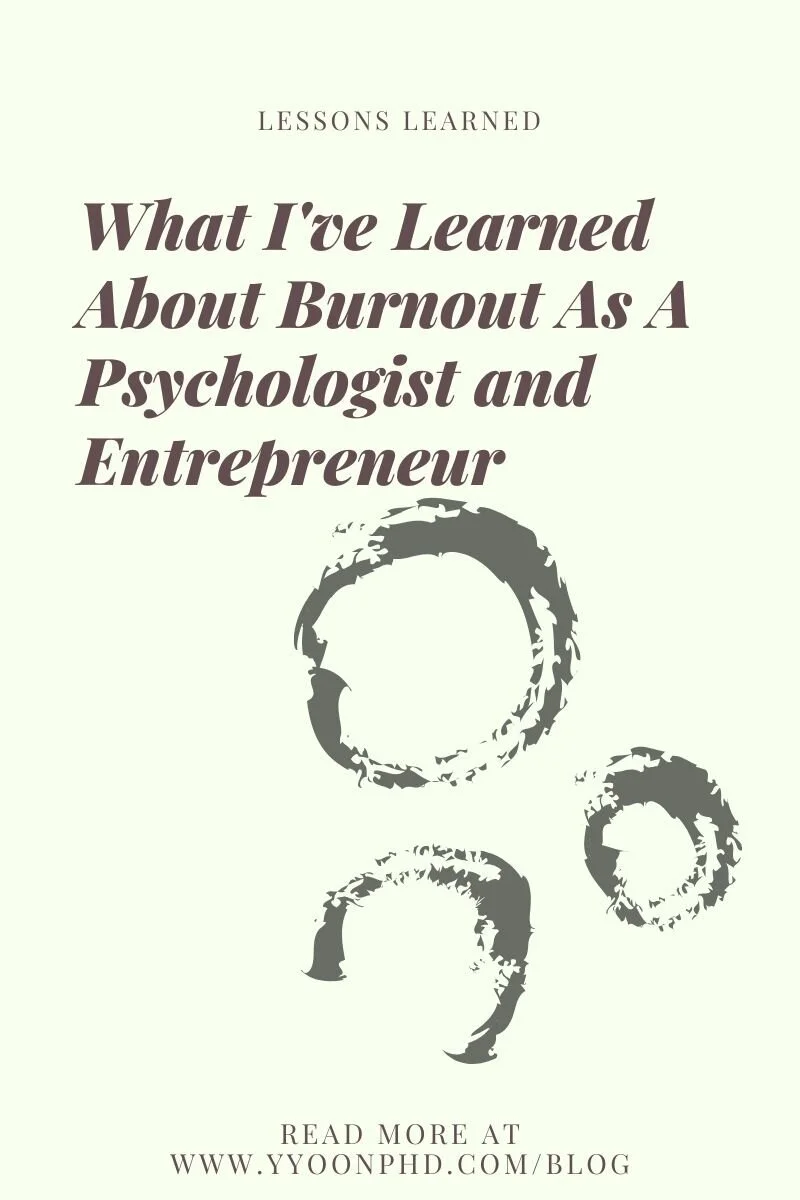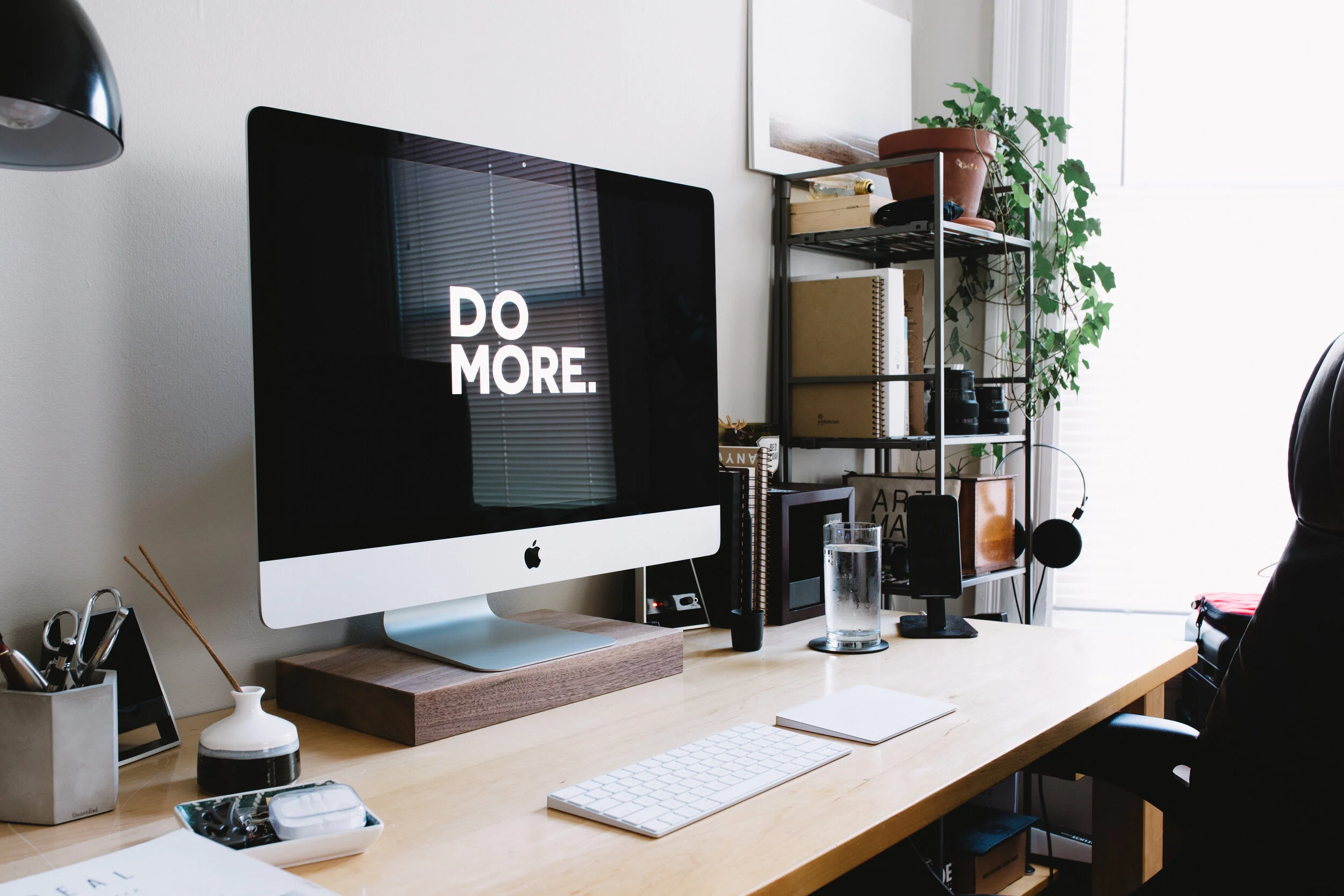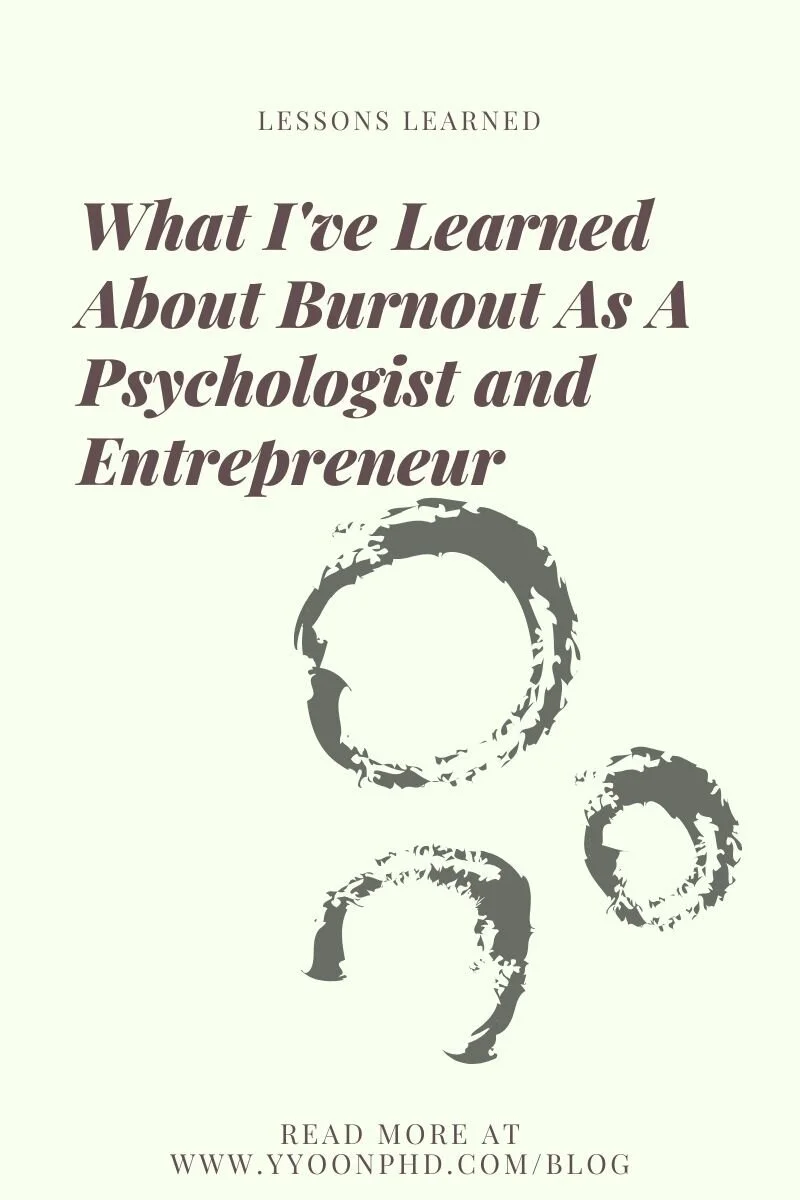Can you remember when you first learned about how to prevent burn out?
I can’t.
I certainly can remember when I learned that it was important to do well, to keep working hard, to keep performing. But I can’t tell you a time when anyone told me that a potential risk of all that was burn out.
When I transitioned from working in an academic setting to becoming a private practice psychologist, I had some vague sense of what it would be like. But the entrepreneurial aspects of it all were relatively lost on me. The entrepreneurial or business aspects of mental health private practice are rarely, if at all, covered in our training and education. Not only were the “how-to” steps not covered, the emotional how-to’s of avoiding burn-out, coping with imposter syndrome, and avoiding the traps of perfectionism were certainly not addressed.
Instead, I have had to learn some of these lessons the hard way throughout my own professional journey. Today I want to share some of the takeaways about burn out that I’ve gained from my own experience. This is not just for entrepreneurs or mental health clinicians. This is for anyone who has ever suffered from burn out, has questioned if they are “doing enough” or have struggled to feel “good enough” despite putting in so much work and energy into any endeavor - whether it be personal or professional.
So basically, it’s for all of you humans out there.
Potential Side Effect of Pursuing your Passion: Burn Out
The thing that makes avoiding burn out tricky is when it is associated with an activity that’s genuinely enjoyable for you. I wasn’t forced into becoming a psychologist. Despite the little known fact that my father got his Ph.D. in Education Psychology, my getting a Ph.D. in Clinical Psychology has nothing to do with him (No offense, Dad!). I became a psychologist because I genuinely love understanding more about the mind, feelings, and behaviors of human beings. And even more so, I love having a positive impact on others’ lives as they gain a greater understanding of their own minds, feelings, and behaviors. Some may call it a passion or a “calling”. So why wouldn’t I put in hours, months, and years of my life into this so-called passion? If it’s indeed my calling or passion, then it seems logical that I’d put in my all to be the best and the most successful psychologist, right?
Let me set the record straight and name one thing: Just because I’ve made it my mission to better understand peoples’ mental health and guide them towards instilling better habits and mindsets, I am not some enlightened version of someone who embodies healthy habits and mindsets 100% of the time.
So when I was looking for some more direction as to how to become the best psychologist and entrepreneur that I could be, I was not immune to getting caught up in “hustle” culture (more on #hustleporn at a later date) or falling prey to well-meaning but often misguided advice regarding pursuing passions and achieving maximal potential and productivity.
I looked for models and advice on “how-to” be the most productive, the most creative, and the most driven and focused. While some of the advice given was helpful, most of it steered me closer to a place of burn out. I had too few models who embodied the healthy messages and practices I needed.
A Breath of Fresh Air In the Midst of the Smog of Noise and Mixed Messages
But recently, I read the following quote by Eileen Pollack on Medium in her article “The Best Thing You Can Do Is Keep Going”:
“The lie we all grew up on is that we’re able to achieve everything we want to achieve, to be happy, fulfilled, and creative all the time — and if we don’t manage to be successful, at everything, the fault is ours.”
When I read this, I felt like a huge weight had been lifted from me. “So it’s not my fault you’re saying?” I thought as I let out a sigh of relief.
Have you ever felt like you aren’t doing enough? Have you ever questioned why you aren’t able to accomplish as much as the next person? Or ever wondered “What is it about me that I can’t do things as well as so-and-so”?
You may experience periods of downtime when you feel less productive, less creative, and have little to no professional stamina. When you experience these periods, you may be tempted to tell yourself “Well, something isn’t working, I need to fix my system, I need to do something differently.” As far as you’re concerned, it’s ultimately your responsibility.
In other words it is your fault.
I’m not saying to immediately start pointing the finger at others and absolve yourself of all personal responsibility. But what I am saying is that there is so much more at play that influences how and what we’re able to do and not do. It’s not fair to you if you keep taking all the blame when you’re not “perfecting” your responsibilities. When we can free ourselves from that lie that has told us that “if we don’t manage to be successful, at everything, the fault is ours”, I truly believe this is when we can really begin living and embodying our passion in a healthy way.
Offering you some real-nice, real-life advice
I mentioned earlier that I felt like I hadn’t gotten enough of what I needed to sustain me in a healthy way throughout my professional journey. So I’ve culled together some things I’ve learned along the way. I use these pieces of advice as reminders every day to keep me grounded. I’m calling it my real nice-real life advice. Catchy ring to it, right?
In no particular order…
“Success” will be defined personally by you and you alone. You are good enough in spite of what others are doing.
Striving for perfection is a trap. Don’t fall into it.
Relatedly, always being productive isn’t possible. Don’t even try.
Rest is essential. Sometimes you’re going to have zero f*cks to give. When you feel that way, step aside and let yourself be for a bit.
However you’re feeling right now, personally or professionally, is okay. I hope you’ve gained some semblance of relief from reading today’s post just as I did when I read Eileen’s article the other day. It’s important to get these healthy doses of relief and advice so that you feel more steady and grounded in whatever next steps you choose to take.
Thank you to those who have reached out to me to share your personal stories and takeaways. Please keep me posted on your thoughts and questions so I know how I can continue supporting you.



